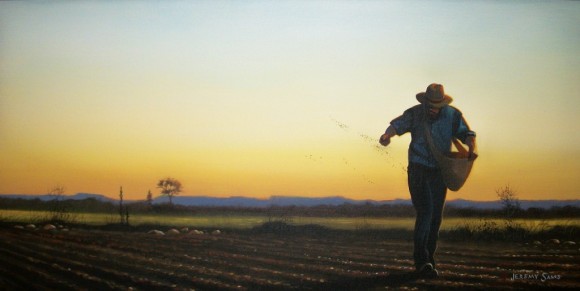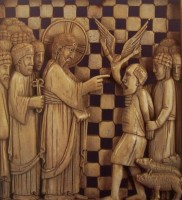A sower went out to sow his seed. And as he sowed, some fell by the wayside; and it was trampled down, and the birds of the air devoured it. Some fell on rock; and as soon as it sprang up, it withered away because it lacked moisture.And some fell among thorns, and the thorns sprang up with it and choked it. But others fell on good ground, sprang up, and yielded a crop a hundredfold. When He had said these things He cried, “He who has ears to hear, let him hear!” Then His disciples asked Him, saying, “What does this parable mean?” And He said, “To you it has been given to know the mysteries of the kingdom of God, but to the rest it is given in parables, that ‘Seeing they may not see, And hearing they may not understand.’ Now the parable is this: The seed is the word of God. Those by the wayside are the ones who hear; then the devil comes and takes away the word out of their hearts, lest they should believe and be saved. But the ones on the rock are those who, when they hear, receive the word with joy; and these have no root, who believe for a while and in time of temptation fall away. Now the ones that fell among thorns are those who, when they have heard, go out and are choked with cares, riches, and pleasures of life, and bring no fruit to maturity. But the ones that fell on the good ground are those who, having heard the word with a noble and good heart, keep it and bear fruit with patience. (Luke 8:5-15)
A word of warning. A word of hope.
These two words best characterize the parable of the sower read for us in this morning’s gospel.
First, a warning.
Because the question that lies behind this story is on that every one living in this world must ask. “If God truly loves us as creatures made for His good pleasure, how is it that there are some who will not inherit eternal life?” How is it, for example, that Christ states in the gospel, very clearly, that “Many are called and few are chosen,” and that “The gate is narrow and the way is hard that leads to eternal life, and that few are those who enter it”? Or, as we find in today’s gospel, “How is it that there are many who have received from the Lord everything they need in order to for their hearts to bear forth a wonderful harvest, and yet fail so miserably at the task?” To which some respond, “Well, if this is all that happens, then why would God even bother with us humans at all? Which just happens to be what many of our atheist detractors say, that the existence of hell is proof of a divine experiment gone horribly wrong. Or, that the God in Whom we believe must be some kind of a cosmic monster who takes a pleasure in seeing his failed creatures suffer in a hell that Christ Himself calls a “weeping and wailing and the gnashing of teeth.” Why bother with creating the world at all if it all goes so catastraphically sideways? This question, as I have said, is the reason why many believe that the gospel is nothing else but “hogwash” of the worst sort.

Photo by Jeremy Sams
Yet the reason you and I are all here today is because we DO believe that the gospel makes sense, even when it speaks of hell as the ultimate form of human failure. Because if we read the holy fathers, what we learn is that hell is a phenomenon we humans have created for ourselves. Simply put, God loves and cherishes everything He makes, every living creature: plants, animals and humans; He loves every grain of sand, every element, atom, particle and quark. Nothing has been left “outside” of His immeasurable love. As humans, God has made us free to accept or reject His love, because without freedom, there is no love. Love and freedom are complimentary realities in that they cannot exist one without the other. Accordingly, for those who accept it, such love becomes the very content of heaven and eternal life; for those who reject it, such love – this same love, becomes the opposite, eternal darkness, sadness, and alienation.
Which is why we say that today’s parable of the sower is first a warning to each of us, that if we human beings fail in our calling, it is only because we have chosen to fail. Things could have been very different. The asphalt could have been broken up. The soil could have been deepened and furrowed. The tares could have been uprooted. This is why the author of Hebrews writes, “Beware, brethren, lest there be in any of you an evil and unbelieving heart which leads you to fall away from the living God.”
But we would be amiss if we were to speak of this parable only in terms of a warning. Because the primary purpose of the parable is to teach us that even though we may have a heart that is cold and calloused , or a heart that is shallow and superficial, or a heart that has become infected by worldly affections, it is still possible for us to overcome these deficiencies. There is hope for us to move ourselves from a state of spiritual barrenness to a state of spiritual fruitfulness, if only we are willing to work with God in order to make it happen. And so, everything in this parable therefore points to the task of preparing, cleansing, and nurturing the soil so that the seed of God’s word might come to life and blossom in the way it should. This, too, is why we practice the ascetical disciplines within the life of the Church. For example, we begin our life of faith by keeping God’s commandments, because the commandments “heal” the heart that has been “asphalted” by habitual sin. Prayer, fasting, and the liturgy of the Church deepen and furrow the heart in preparation for the implantation of the word. And by fighting the good fight in order to overcome the sinful passions, we uproot all of those worldly “tares” that spring up in place of the good things that should be growing instead.
The parable thus concludes with the following affirmation. “And as for those with the good soil, they are those who, hearing the word, hold it fast in an honest and good heart, and bring forth fruit with patience.” God will provide us with a good harvest, with a harvest that is abundantly rich, if only we do our part. Which brings us to the last 2 words of the parable, which are the crux upon which the entire parable is built. Here the Lord says that it is not simply that those who have a good and honest heart are those hear the word and multiply the word, but that such hearts are “good and honest” because they do it all “with patience.” This is why we focus ourselves as Orthodox Christians on the “little things” that belong to the spiritual life: to daily prayer, to attendance at Church services, to the study of the scriptures, to the guarding of our thoughts and feelings, to confessing our sins, and all the rest. We DO these things patiently, regularly, time and time again, knowing that God will bless us if only we remain faithful to the task. “For he who endures to the end will be saved.”
So today, may God help us to take heed to the warning, that the possibility of spiritual failure is a very real possibility. Yet if we truly believe that the life of the heart is all that matters, and that if we consecrate ourselves wholly to the work of cultivating our hearts with patience and perseverance, then we can know for sure that God can and will bring forth within each of us an abundant harvest. “For by this is my Father glorified, that you bear much fruit and so prove to be my disciples.” Amen.


















